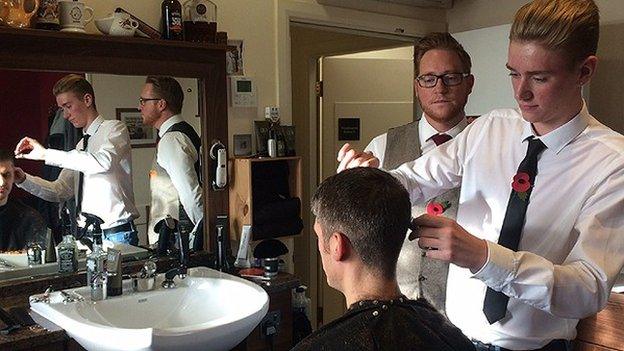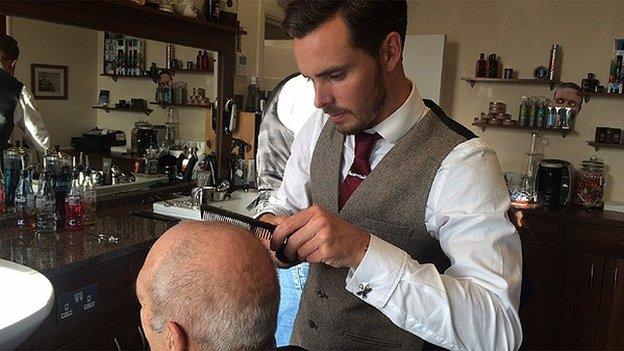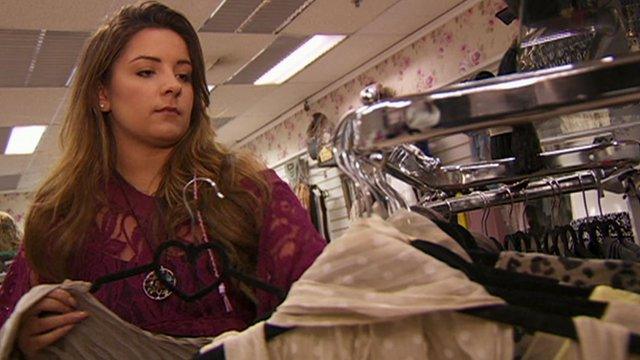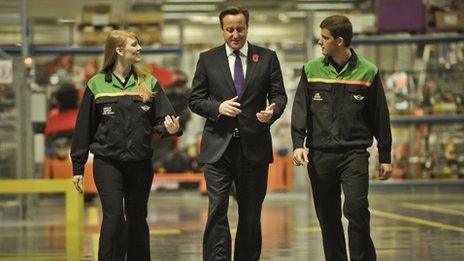Are apprenticeships key to solving youth unemployment?
- Published

Ben Sparkes is being mentored by his manager Matt Perham during his apprenticeship
Seventeen-year-old Ben Sparkes from Chelmsford in Essex is on a government scheme to boost the numbers of apprentices. It is hoped measures like this will help the numbers of unemployed young people continue to fall.
Young people bore the brunt of the financial crisis, with almost a quarter (22.5%) unemployed in 2011. Since then the rate has fallen, and Thursday's Labour Market statistics show 16% of 16-24 year olds are unemployed.
However the numbers of young people out of work is still significantly higher than the 6% rate for the working population as a whole.
Ben began a new position as an apprentice hairdresser this week at a men's barbers in Basildon. He had already completed an NVQ in women's hairdressing at college, but decided that he preferred to cut men's hair.
"I took an apprenticeship because I felt it was a better way of learning, because you get people skills at the same time," he says, "and you get paid to learn as well."
However, the pay is low. Ben is earning the national minimum wage for apprentices, which is £2.73 per hour.
He is expected to complete at least 12 months training, which includes a day release course at college. By the end of the course he will have achieved another NVQ, in barbering. An NVQ is considered equivalent to five GCSEs.
His boss, Matt Perham, who runs Rusty's Barbershop in Basildon, gets £1,500 from the government scheme, to cover some of his wages.
"I like employing apprentices because you can train them up exactly to your standards," he says, "Sometimes those with more experience have picked up bad habits, and it's harder to change at that point. I think it's a good way to start out in the business."

An apprenticeship for Ashley Knott led to full-time employment
Apprenticeships have suffered in the drive to improve academic standards at schools and universities, with the message to young people often being that a university education is all that counts.
England lags a long way behind other rich countries in its numbers of apprenticeships, according to a recent report by the think-tank Demos, with 11 apprentices per 1,000 employees, compared to 39 in Australia, 40 in Germany, and 43 in Switzerland.
The report estimated that boosting the numbers of apprentices to similar levels would improve Britain's GDP by £4bn a year.
A new drive, launched last month, to boost the numbers of apprentices has vastly extended the range of jobs open to apprentices, and the highest level apprentices can go on to achieve the equivalent of a university degree. Some of the most sought after apprenticeships with the top firms pay very well - up to about £25,000.
Apprenticeships are now available in careers ranging from advertising, to legal work, to art galleries, and information technology, to name but a few of the 1,200 job roles on offer.
Back at the barbers, Ben replaced another apprentice, Ashley Knott, who has been given a permanent job after a year of training.
"I don't think apprentices get the respect they deserve," he says. "For me it's changed my life for the better. Some people see it as cheap labour, making tea and sweeping the floor, but before you know it you're on the shop floor working full-time. I'm really enjoying it."
Andrew Bomford's full report will be broadcast on the PM programme on Thursday 13 November at 17:00 GMT.
You can listen to the PM programme's Employment Week series from 10-14 November on BBC Radio 4 at 17:00 GMT. Or catch up later on BBC iPlayer
- Published20 August 2014

- Published28 September 2014

- Published28 October 2013
